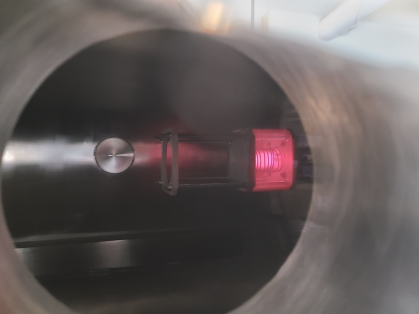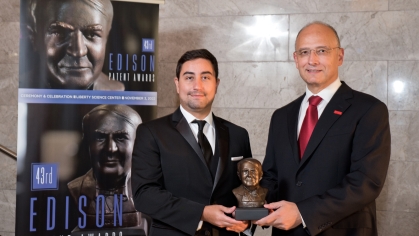LAB REPORT: Advancing Spaceflight and Aerospace Propulsion

Shortly after joining the Department of Mechanical and Aerospace Engineering (MAE) as an assistant professor in 2023, Steven Berg established his SPACE Lab (Space Propulsion with Advanced Chemistry and Energetics Lab), which is dedicated to advancing spaceflight and aerospace propulsion.
The SPACE Lab group is currently exploring spacecraft and rocket propulsion, propellants and energetics, spacecraft environments and operations, and general applications of plasma chemistry. Berg was recently awarded a prestigious $500,000, two-year Defense Advanced Research Projects Agency, or DARPA, Young Faculty Award (YFA) for his project, “Data Driven Engineering for VLEO Spacecraft Aerodynamic Performance Enhancement.” He is seeking a way to enable sustained flight at VLEO – very low Earth orbit – which he has described as a “no man’s land” between spaceflight and atmospheric flight – is a current focus of his lab.
Enabling Flight in Very Low Earth Orbits

“This project ventures into that unknown, which to me is part of the spirit of aerospace research, both past and present.” By enabling a better view of Earth, with the same coverage of a satellite, Berg predicts that the project “is likely to transform and advance spaceflight and propulsion, both in terms of scope and potential.”
By setting up a unique wind tunnel to simulate high speeds and replicate satellites’ experience in VLEOs, Berg says, “We hope to unlock flight in VLEOs, a regime not currently accessible by either spacecraft or aircraft. If this regime could be unlocked, it could enable significant advances in commercial satellite capabilities, enable scientific missions to better understand the Earth, and enhance national security.”
Collaborating on a New Rocket Propellant for Spaceflight
The SPACE Lab has additionally been collaborating with the University of Illinois at Urbana-Champaign on a NASA-Funded Small Satellite Technology project to qualify a novel rocket propellant, able to perform in both a high thrust chemical combustion mode as well as a high efficiency electric mode, for spaceflight. Once it passes required safety tests, Berg says that “the propellant will then be flown on a suborbital launch mission.”
Pushing Beyond the Boundaries of Engineering
Berg says that after seeing the movie Apollo 13, he wanted to be an astronaut, although he grew to be too tall to qualify for the program. Instead, he pursued aerospace engineering – and ongoing research projects.
“I think what keeps me excited about the field is operating at the very limits of engineering – or sometimes above,” he explains. “We use a lot of niches and exotic physics, so I find there is always something interesting to explore. I also like that we can do a lot of hands-on work.”


